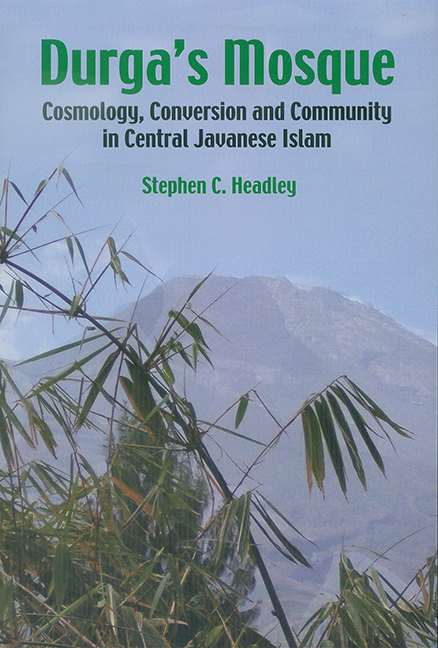Book contents
- Frontmatter
- Contents
- List of Figures
- List of Tables
- Preface
- Acknowledgements
- Introduction: Cosmology, Conversion and Community in Javanese Islam
- PART I THE SOCIOLOGY AND PRACTICE OF RELIGION IN CENTRAL JAVA
- 1 Of Palaces and Placentas: The Praxis of Javanese Kindred
- 2 The Village “Kingdom”: The Bed of Sri and the Realm of Sadana
- 3 Village Goddesses, Their Hierarchy and Clientele
- 4 Deterritorialization: The End of Peasant Livelihood
- PART II RECONSTRUCTION OF LOCAL RELIGIOUS HISTORY
- PART III INVOKING THE COSMOS, MAGNIFYING ALLAH: STRUCTURING A LANDSCAPE IN THE SEVENTEENTH TO NINETEENTH CENTURIES
- PART IV COSMOLOGY, CONVERSION AND COMMUNITY IN CENTRAL JAVANESE ISLAM TODAY
- Bibliography
- Index
- About the Author
3 - Village Goddesses, Their Hierarchy and Clientele
from PART I - THE SOCIOLOGY AND PRACTICE OF RELIGION IN CENTRAL JAVA
Published online by Cambridge University Press: 21 October 2015
- Frontmatter
- Contents
- List of Figures
- List of Tables
- Preface
- Acknowledgements
- Introduction: Cosmology, Conversion and Community in Javanese Islam
- PART I THE SOCIOLOGY AND PRACTICE OF RELIGION IN CENTRAL JAVA
- 1 Of Palaces and Placentas: The Praxis of Javanese Kindred
- 2 The Village “Kingdom”: The Bed of Sri and the Realm of Sadana
- 3 Village Goddesses, Their Hierarchy and Clientele
- 4 Deterritorialization: The End of Peasant Livelihood
- PART II RECONSTRUCTION OF LOCAL RELIGIOUS HISTORY
- PART III INVOKING THE COSMOS, MAGNIFYING ALLAH: STRUCTURING A LANDSCAPE IN THE SEVENTEENTH TO NINETEENTH CENTURIES
- PART IV COSMOLOGY, CONVERSION AND COMMUNITY IN CENTRAL JAVANESE ISLAM TODAY
- Bibliography
- Index
- About the Author
Summary
INTRODUCTION
In the first chapter we isolated two features of Javanese social morphology — lineages and the foetus siblings — which favoured the creation of worship communities and the articulation of the Javanese society within the cosmos. Despite the strength of the Asiatic commercial networks and a limited occidentalization of this Javanese “crossroads”, the particularity of the cognatic societies in the centre of the Nusantara archipelago was that the social organization of Java (Lombard 1990), the social inheritance of the concentric medieval kingdoms, and the divine right rice agriculture with its strict social hierarchy founded economically on an apanage system, were to be harmonized as a whole, so that cohesion and equilibrium were constant preoccupations.
In Chapter 2, we saw that during the life of a person, myth and ritual bind him/her through a web of correspondences together with his/her foetus siblings’ cosmic dimensions. These two levels, micro and macrocosmic (jagad alit; jagad gedhé), refer to one another at the same time as the greater envelops the lesser. The conclusion of Chapter 2 concerned the semantics of Ego's generation in Austronesian kinship classifications where the symbolic expressions of elder sister-younger brother marriage appeared in Javanese myths defining kingship in terms of marriage with an elder female goddess. In Javanese and Malay, spouses are classified by a distinctive use of elder/younger and are assimilated to the category of intimate cross-sibling. In eastern Indonesian this linguistic feature can become the basis for designating the prescribed spouse.
Whereas in Chapter 2 we sketched out the relationship of village cults of the rice goddess Sri to those at the centre of the Javanese kingdoms in the palace, here we shall explore other provincial cults of female divinities, and how they relate. The rice goddess (dewi) Sri is not the only female divinity worshipped in the palace complexes (kraton) of the Javanese kings (ratu) or venerated in shrines in the countryside.
- Type
- Chapter
- Information
- Durga's MosqueCosmology, Conversion and Community in Central Javanese Islam, pp. 133 - 162Publisher: ISEAS–Yusof Ishak InstitutePrint publication year: 2004

